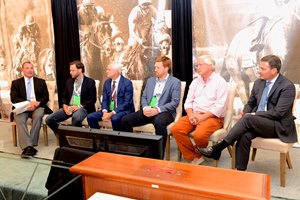State of the Industry Addressed at Owner Conference


It was a talk and a question-and-answer session about "The State of the Industry," and one panelist framed the Oct. 29 closing session at Day One of the Thoroughbred Owner Conference rather neatly with a simple question.
"Are the ways we are doing things the right way to do them?" said Craig Fravel, the president and CEO of the Breeders' Cup.
Fravel, soon to become the CEO of racing operations for The Stronach Group, was one of five panelists discussing racing's most pressing issues at the conference, which is hosted by OwnerView—a program developed by The Jockey Club and TOBA—BloodHorse, Breeders' Cup, and The Stronach Group.
He was joined by Aidan Butler, TSG's chief strategy officer and acting executive director of California racing operations, owner and Keeneland trustee Everett Dobson, Kip Levin, president and COO of the FanDuel group, which includes the TVG horse racing network, and James Gagliano, president and COO of The Jockey Club, in addressing more than 100 attendees.
Though the conference took place against the backdrop of Santa Anita Park, a TSG track which has been the site of more than 30 equine fatalities this year, the discussion only made a brief mention of ways to reduce fatal injuries.
That part came when Butler talked about a PET scanner, an imaging device that can give veterinarians a better look at the internal structure of a horse's foot that Santa Anita hopes to make available in December.
"Our belief is that using it with other technology we have can address an area of trouble in equine athletes and anything that can pre-diagnose a problem in that area is going to be a really cool thing to have at a racetrack," Butler said.
Otherwise, a large chunk of time was spent on what Fravel called the "L word," or "the elephant in the room that keeps us fighting."
He was speaking, of course, about the diuretic Lasix and the push to get Congressional approval of the Horse Racing Integrity Act (HRIA) that creates national standards to eliminate the use of race day medications.
"We believe that with the passage of this Act, significant improvements in safety and the integrity of the sport will come," Gagliano said. "The bedrock (of a sport) is to have the right rules and integrity and all the safety measures you can."
Dobson was adamant in his support of the HRIA.
"We can go one of two ways," he said. "We can go as far as we can for safety and integrity and move the needles on a lot of fronts. Or we can accept the status quo, business as usual, and I'm here to say that's not a path we at Keeneland or Everett Dobson as a horse owner is willing to take. We have to be better at what we do. It's not easy, but failure is not an option."
Butler offered TSG's strong support, saying, "We truly believe at The Stronach Group that going toward international standards, which is no race day medications, is something that North America as a whole should go toward in the future."
A segment on the use of riding crops addressed the negative perception some people attach to their use.
"We want to confront a perception," Gagliano said. "Whether it's (limited to) one strike or three or four strikes it's not going to solve the perception issue that we know and our research has shown is a turn-off, especially with new fans who do not understand it."
Levin discussed the rise of sports betting in approximately 15 states and how in New Jersey, sports betting dwarfs his company's handle on horse racing.
"It's here, it's spreading very fast, and my point of view is that sports betting provides us a unique opportunity to introduce horse racing to a much bigger audience of fans," Levin said. "It's a huge positive. If horse racing can fold into sports betting there's a huge opportunity to find new fans."
In touching on the upcoming Nov. 1-2 Breeders' Cup at Santa Anita, Fravel, who will move into his new position with TSG after the event, said there was a unanimous sentiment this summer by the Breeders' Cup board to keep the event in California, even after the horrific number of equine deaths earlier in the year. Fravel said he believed the action taken by California racing as a whole in response to the tragedies merited support.

"It wasn't that hard of a decision," Fravel said. "Back in March and April The Stronach Group and the horseman and the California racing board recognized the problem and took immediate steps to address it, and they were important and effective steps. In my view, and the Breeders' Cup board was unanimous in agreeing with it, when people do the right things you can't turn your back on them. You have to recognize when people do the right thing."
